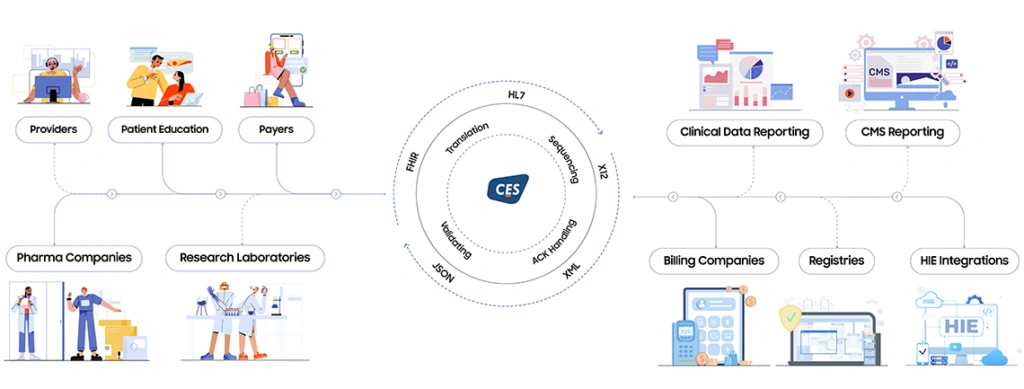Effective Implementation of Healthcare Integration and Data Translation Channels.
Digital data continues to impact US healthcare significantly, offering unprecedented opportunities for improved patient care. However, the complexity of the healthcare system, with its multitude of entities, isolated databases, and incompatible systems, hinders the efficient sharing and accessibility of crucial information. Fortunately, healthcare integrations and data translation have emerged as robust solutions to tackle these challenges head-on. In this blog, let us explore how this duo resolves US healthcare’s constant challenges.
Current Healthcare Sector Challenges and Resolutions
Lack of Care Coordination
Challenge: A critical issue in the US healthcare system is the presence of information silos among different healthcare entities, leading to fragmented care, errors, and treatment delays.
Solution:
- Interoperable systems break the information silos between healthcare applications.
- Data availability and real-time sync across the hospital.
- Quality of data helps provide holistic patient care and better outcomes.
Manual Inefficiency
Challenge: Legacy systems in healthcare heavily rely on manual processes, making them susceptible to human errors in medical reports.
Solution:
- By synchronizing the patient data across all Electronic Health Records (EHRs) and automating repetitive tasks, healthcare organizations can streamline administrative tasks and eliminate medical errors.
- Minimize manual errors while entering lab reports and patient clinical data from various monitoring devices by adopting electronic prescriptions.
Insurance Fraudulence
Challenge: False insurance billing and fraudulent claims contribute to escalated healthcare costs and divert funds from those in genuine need.
Solution:
- Seamless Integration between the providers and payers streamlines the health insurance claim settlement process.
- Using the integration with standard formats helps prevent malpractices like upcoding etc.
- Interoperable systems allow organizations to perform real-time eligibility checks even before the service.
Compliance and Security Challenges
Challenge: Healthcare providers grapple with safeguarding patient data and maintaining compliance and data security, leading to breaches and privacy worries.
Solution:
- Data breaches can be avoided by an integrated system that adheres to the rigorous security standards set by CMS (Centers for Medicare & Medicaid Services).
- Integrations developed with HL7 standards help organizations achieve compliance with various regulations and guidelines like HIPAA and HITECH.
Rigid Patient Care Services
Challenge: Healthcare services often adopt a standardized and inflexible approach, burdening medical professionals, staff, and patients leading to monotony, time wastage, burnout, and unwanted expenses, hindering effective healthcare delivery.
Solution:
- Integrations are pivotal in linking diverse healthcare entities such as medical billing, patient intake systems, scheduling applications, and patient portals to EHRs.
- This connectivity significantly slashes administrative expenses within hospitals and alleviates the strain on healthcare providers.
- Moreover, integrations enhance patient convenience by granting them easy access to appointment booking, prescription refills, and follow-ups right at their convenience.
Fragmented Health Data
Challenge: Health records scattered across various providers and systems hinder data sharing and accessibility, affecting continuity of care and treatment decisions.
Solution:
- Integration paves the way for advanced analytics and AI capabilities by bringing the data together.
- It streamlines data collection from various sources: EHR, LIS, portable devices, and wearables.
- Data-driven decision-making supports vital medical practices like population health management, disease surveillance, and identifying trends & patterns.
The CES Approach: Enabling Seamless Integrations to Achieve Effective Interoperability
A fully interoperable healthcare ecosystem requires integrating all your existing systems using standardized interfaces and protocols. With our 20 years of US healthcare expertise, we understand distinct pain points in the healthcare ecosystem and provide customized solutions for your intricate integration requirements. Our comprehensive end-to-end services encompass development, implementations, and ongoing support.

CES Healthcare Integrations Development Services
- Developing Integrations for any PMS and EHRs.
- Integrations using FHIR, HL7, APIs, and ODBC Standards.
- Integrating Electronic Health Records (EHR), Laboratory Information Management Systems (LIMS), Health Information Exchange (HIE), Care Coordination Platforms etc.
CES Healthcare Integrations Implementation Services
- Simple to Complex Implementations.
- Existing Integration Solutions.
- Technical, Functional, and Application Solutions.
CES Healthcare Integrations Support Services.
- Monitoring and Reporting.
- Troubleshooting at L1/L2/L3.
- Data Migration Support from Legacy to FHIR Standards.
Besides our comprehensive services, we offer a robust in-house healthcare integration accelerator to deliver a reliable, scalable, and cost-efficient integration solution. The key features of our solution are as follows:
- Seamless Interoperability: The accelerator enables smooth data exchange between cross-platform applications and supports various data formats like HL7 v2, JSON, XML, Flat file, and more.
- Flexible Deployment: Easy application deployment and setup across various platforms, including on-premises and cloud platforms, ensuring flexibility and adaptability.
- Easy Data Translation: With plug-and-play translation services, our accelerator converts HL7 v2 message types to FHIR resources and vice versa, streamlining data integration.
- Real-Time Monitoring and Alerts: Equipped with real-time monitoring capabilities, it provides valuable insights into the integration process and immediately sends alerts for prompt actions.
We have a reliable support team to guide you through every step of the integration journey for a successful implementation. To know how our services powered by in-house accelerator elevate patient care quality, streamline health data exchange, bolster security measures, and optimize resource utilization; Request a demo at info@cesltd.com.
